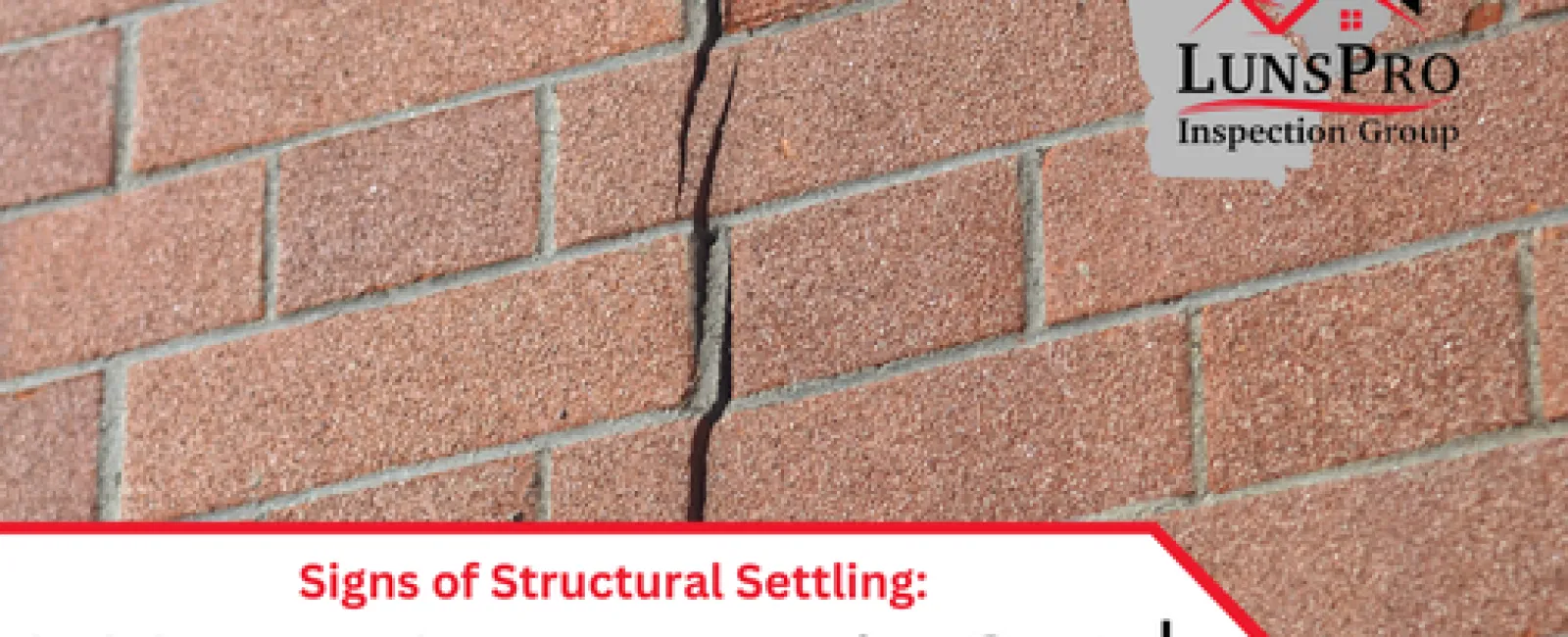One of the most common concerns for homeowners is structural settling. Over time, homes naturally settle into the ground due to various factors such as soil conditions, construction techniques, and environmental changes. While some settling is normal, significant or uneven settling can lead to structural issues that compromise the integrity of a home. Understanding the signs of structural settling and knowing when to take action is essential for protecting your property's value and safety.
At LunsPro Inspection Group, our team of experts specializes in identifying signs of structural settling through comprehensive Carolina residential and commercial inspections. Whether you're concerned about your foundation, walls, or floors, our Charlotte, NC home inspector team utilizes advanced technology such as Carolina drone inspections and Carolina septic and sewer scope inspections to provide a detailed assessment of your home's structural integrity.
What Causes Structural Settling?
Structural settling occurs when the foundation of a home shifts due to soil movement, water infiltration, or inadequate construction practices. In Charlotte, NC, and throughout the Carolinas, homes are particularly susceptible to settling due to the region's clay-based soils, which expand and contract with moisture levels.
- Soil Conditions. Homes built on expansive soils, such as clay, are more likely to experience settling. As the soil absorbs water, it expands, putting pressure on the foundation. Conversely, during dry periods, the soil contracts, leading to foundation movement. Over time, this constant expansion and contraction can cause cracks in walls, uneven floors, and misaligned doors and windows. Carolina homes, especially in regions with heavy rainfalls or prolonged droughts, are particularly vulnerable to these soil-related shifts. Regular Carolina home maintenance and inspections can help identify early signs of soil-related foundation issues before they become severe.
- Water Infiltration. Water infiltration is another common cause of structural settling. Poor drainage systems, leaky plumbing, or inadequate waterproofing measures can cause water to accumulate around the foundation. When the soil surrounding the foundation becomes oversaturated, it weakens and loses its ability to support the home, causing the foundation to shift or sink. Homes located in areas prone to flooding or with improper grading are especially at risk. Our Carolina home inspector team also conducts Carolina septic and sewer scope inspections to identify any hidden water sources that may be contributing to settling, helping homeowners address these issues before they lead to major structural problems.
- Inadequate Construction Practices. Sometimes, structural settling occurs because of poor construction practices. If a home's foundation was not properly designed to accommodate the type of soil it was built on or if subpar materials were used during construction, the house may begin to settle prematurely. Other issues include insufficient compaction of the soil before the foundation was poured or improper installation of footings and support beams. Our Charlotte, NC home inspection team has the expertise to evaluate the construction quality of homes and can identify potential risks related to structural settling.
- Tree Roots and Vegetation. While less common, tree roots and certain types of vegetation can contribute to structural settling. Trees planted too close to a home can cause the soil to dry out as their roots seek water, leading to soil shrinkage and foundation movement. Additionally, large roots can grow under the foundation and create pressure that lifts or cracks the structure. Homeowners in wooded areas or those with large trees near their property should be vigilant about monitoring for signs of foundation stress.
- Temperature Fluctuations. In the Carolinas, temperature fluctuations between seasons can also play a role in foundation settling. Extreme heat can cause soil to dry out, while cold temperatures can freeze moisture in the soil, leading to expansion. These constant changes can weaken the soil's stability, making the foundation more susceptible to movement over time. Homeowners in regions experiencing significant temperature swings should ensure that their foundation is properly insulated and protected from environmental changes.
Signs of Structural Settling
Recognizing the signs of structural settling early can prevent more serious damage down the line. Here are some common indicators that your home may be settling unevenly:
Cracks in Walls and Ceilings. Small hairline cracks in walls or ceilings are often a normal part of a home's aging process. However, large cracks or those that appear suddenly may indicate significant foundation movement. Look for horizontal or stair-step cracks, which are particularly concerning.
Uneven Floors. Sloping or uneven floors are a telltale sign of structural settling. As the foundation shifts, it can cause the floors to become unlevel, which may affect door frames, windows, and other parts of the structure. Our Charlotte, NC home inspector team uses precise leveling tools to assess floor evenness during Carolina residential and commercial inspections.
Sticking Windows and Doors. If you've noticed that windows or doors are becoming difficult to open or close, it could be due to settling. As the foundation shifts, it can cause the frames around doors and windows to warp, leading to operational difficulties.
Gaps Between Walls and Floors. Another sign of settling is the appearance of gaps between walls and floors or walls and ceilings. These gaps may indicate that the foundation has shifted unevenly, pulling the structure apart at key joints.
Bowed or Leaning Walls. If you observe that any of the walls in your home are bowing inward or outward, it may be a sign of significant foundation movement. Bowed walls are often accompanied by cracks and indicate a serious structural issue that requires immediate attention.
When to Seek Professional Help
While some settling is normal, it's crucial to know when it's time to call a professional inspector. At LunsPro Inspection Group, we recommend scheduling a thorough inspection if you notice any of the following:
- Large cracks in walls or ceilings
- Doors and windows that stick or won't close properly
- Significant changes in floor levelness
- Water pooling around the foundation
Our Carolina home inspector team is trained to identify both minor and major signs of settling. During an inspection, we assess all aspects of the home's structure, from the foundation to the roof, using advanced tools and techniques such as Carolina drone inspections and Carolina radon testing to ensure a comprehensive evaluation.
Structural settling is a natural process that occurs in all homes, but it's important to recognize the difference between normal settling and problematic settling that requires professional intervention. By identifying the signs of structural settling early, homeowners can avoid costly repairs and maintain the safety and integrity of their property.
If you're experiencing any signs of structural settling in your home, don't hesitate to contact LunsPro Inspection Group. Our Charlotte, NC home inspector team is equipped with the knowledge and expertise to provide thorough Carolina residential and commercial inspections, ensuring that your home is safe, secure, and structurally sound. We also offer a range of additional services, including Carolina pool inspections, Carolina mold and air quality testing, and Carolina home maintenance assessments to help you stay on top of your home's needs.

